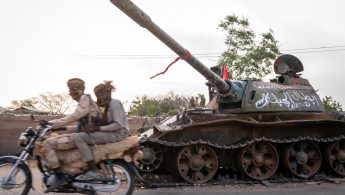Mounting casualties in Sudan’s Al Fasher as battles intensify between RSF and armed forces
Civilians in the Sudanese city of Al Fasher have been facing intensive fighting between the paramilitary Rapid Support Forces (RSF) and the Sudanese army over the past week, as the paramilitary group closes in on North Darfur’s last major city under the control of the Sudanese army.
Heavy fighting has been reported across the city over the past week, killing hundreds of civilians, according to researchers and international organisations, including Médecins Sans Frontières (MSF).
Despite repeated calls from the international community for de-escalation in the year-long conflict and warnings of mass civilian casualties, the RSF has pressed on with its siege of North Darfur's capital city, which has trapped some one million people inside.
There are fears that RSF militants, who are formed of Janjaweed militias, the notorious fighters who conducted ethnic cleansings in 2003, could commit the same atrocities.
The UN humanitarian chief Martin Griffiths warned this week that 800,000 people were at risk in Al Fasher after fighting erupted on 10 May.
Since then, 850,000 people have been displaced from neighbourhoods in the northern and eastern parts of the city, with residents reporting the use of heavy weapons and indiscriminate bombing by RSF militants.
The South Hospital in Al Fasher is the province's main medical centre and is rapidly becoming overwhelmed with injured civilians.
More alarming reports from El Fasher, North Darfur, #Sudan:
— Martin Griffiths (@UNReliefChief) May 12, 2024
- A strike near a pediatric hospital supported by @MSF damaged the roof of the intensive care unit, killing two children.
- Medical supplies are running dangerously low in the Southern Hospital.
MSF's deputy coordinator in Al Fasher said that the hospital has received some 454 wounded patients in the past week as fighting intensified, and there are fears the numbers will rise.
"Fifty-six people have succumbed to their injuries, but the wounded and death toll are likely to be far higher since the fighting continues to be so intense that many people cannot reach the hospital," Dr. Prince Djuma Safari said.
The doctor described scenes of snipers in the streets, heavy shelling and "nowhere in the city" being safe.
"Until now, North Darfur had been a relatively safe haven compared to other parts of Darfur," Dr. Safari said, adding that the hospital is overwhelmed by patients needing surgery and depleting medical supplies.
The year-long war has devastated swathes of Sudan and prompted a refugee crisis after thousands of Sudanese fled to the neighbouring countries of Chad, South Sudan, Ethiopia and Egypt.
The UN has said that 25 million people need humanitarian assistance, with four million facing famine. There are fears that conditions could worsen ahead of the country’s rainy season.
@DNforHR is deeply concerned about the current situation in North Darfur. There has been a renewal of clashes between the SAF and the RSF,with heavy weapons being used within the city of Fasher since this morning. This will affect a significant number of IDPs in El Fasher. pic.twitter.com/spQ3TJuKOD
— Darfur Network for Human Rights (@DNforHR) May 10, 2024
The international community has urged the warring parties to de-escalate, but this “back-door diplomacy” has failed, according to Sudan specialist Shayna Lewis.
"The current approach of the international community, featuring back-door diplomacy to try to influence the belligerents, has failed. With fighting rapidly escalating, words alone from the international community won't protect civilians' lives. They need to act,” Lewis said.
Additionally, there are fears for the hundreds of thousands of vulnerable Sudanese in North Darfur's Zamzam camp, some of whom have been living there since the Janjaweed’s 2003 massacres.
Nathaniel Raymond, a researcher tracking the conflict through open-source intelligence at the Yale Humanitarian Research Lab, has said that unless states intervene, there are just "days and weeks" until reports of "mass graves" emerge in the area.
"RSF will engage in ethnic cleansing – unless governments finally act to stop the flow of weapons and sanction commanders behind these attacks," Raymond said.
"The RSF has burned as many villages in just over the past month around El-Fasher as we documented during the first four months of the war. There is no doubt about what RSF intends to do to non-Arab civilians if they capture El-Fasher."
Yale Humanitarian Research Lab's latest report found that 87 percent of conflict-related damage in El Fasher from May and March occurred between 9 and 14 May, as the RSF launched attacks on the city.
Conditions have made it challenging for international aid workers or journalists to enter Sudan, and as a result, observers are reliant on satellite imagery and reports from civilian journalists when possible.
The ongoing hostilities are disrupting aid channels, humanitarian agencies have said. More than a dozen UN trucks loaded with medical supplies and food, which left Port Sudan on 3 April, have still not reached Al Fasher, the UN said on Thursday.




 Follow the Middle East's top stories in English at The New Arab on Google News
Follow the Middle East's top stories in English at The New Arab on Google News
![A group of Palestinians, foreign and Israeli activists gather to participated in an olive picking event on the land in the town of Battir, which is under threat of confiscation by Israel in Bethlehem, occupied West Bank on 8 November 2024. [Getty]](/sites/default/files/styles/image_330x185/public/2182930803.jpeg?h=199d8c1f&itok=__0LgGsa)

![People gathered around the rubble of destroyed houses to search for survivors [Getty]](/sites/default/files/styles/image_330x185/public/2024-11/GettyImages-2184733820.jpg?h=199d8c1f&itok=NiM1LO2f)